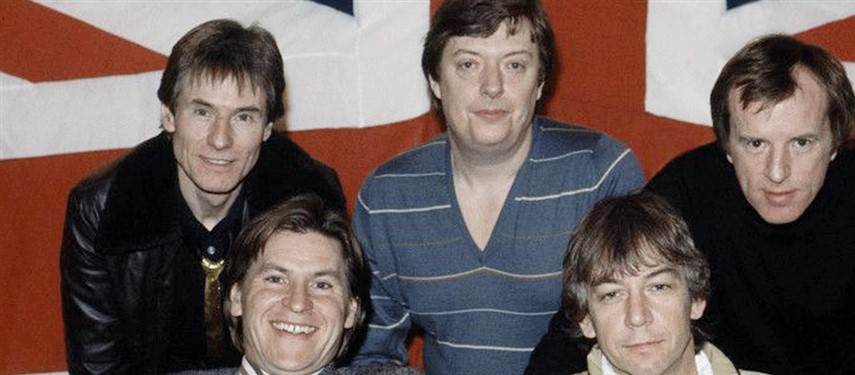‘The House of the Rising Sun’ helped bring global fame to his English rock band
Hilton Valentine’s memorable A minor arpeggio electric guitar riff on the 1964 track ‘The House of the Rising Sun’ helped bring global fame to his English rock and rhythm-and-blues band the Animals, of which he was an original member.
Although the song, about a questionable venue in New Orleans, was a century-old folk/blues number previously recorded by artists including Lead Belly, Woody Guthrie, Joan Baez and Bob Dylan (who admitted that he copied New York folk singer Dave Van Ronk’s version), the Animals’ track is widely considered definitive.
Rolling Stone magazine ranked it No. 122 among the 500 greatest songs of all time and, as a traditional folk song recorded by an electric rock band, it has been described as the first folk-rock hit.
Two years after Dylan put out an acoustic guitar version of the song on his 1962 self-titled debut album, he heard the Animals’ version on his car radio, jumped out of the vehicle, banged on the hood and decided there and then to go electric, according to the Animals’ drummer John Steel, who once said Dylan had told him that to his face.
‘Rising Sun’, which reached No. 1 in the United States and the United Kingdom, became the signature tune of the band from the coal-mining northeastern English town of Newcastle upon Tyne. Yet it was the least rock-and-roll of their many hits, which included ‘It’s My Life’ (with Valentine on electric 12-string), ‘Don’t Let Me Be Misunderstood’ (previously recorded by Nina Simone) and ‘We Gotta Get Out of This Place’. The latter became something of an anthem among US “grunts” — young conscript soldiers fighting in Vietnam.
Valentine died January 29 at 77 at his home in Wallingford, Conneticut, according to his U.S.-based record archive company ABKCO Music & Records. They gave no cause of death.
To rock guitar lovers, Valentine was no Jimi Hendrix, Eric Clapton or Duane Allman, and he received less fan adulation than the Animals’ lead singer and their jazz-inspired electric organist Alan Price, whose mesmerizing solo and coda also graced the ‘Rising Sun’ track along with Eric Burdon’s powerful, soulful vocals. But Valentine played lead and rhythm guitar, and his hard-edge riffs were a driving force in the band’s success.
“It really was Hilton who made the early Animals a rock band,” Burdon told the online magazine Guitar International. “Because I don’t think the element of rock was in the band until we found him. In those days, Hilton wasn’t just playing rock-and-roll, he looked rock-and-roll. Here was a guy with the greased mop of hair combed back, cheap leather jacket, winkle-picker shoes, black jeans and a smile on his face playing through an Echoplex [amplifier], which was a secret weapon back then.”
The latter was a recording studio tape-delay device — also used by guitarists such as Allman of the Allman Brothers and Joe Walsh of the Eagles — which gave echo and added depth to guitars and other instruments.
Valentine and Steel also leaned heavily on the music and beat of Mississippi-born blues-rock singer and guitarist Bo Diddley, notably on the track ‘Story of Bo Diddley’, which opened their 1964 debut album, ‘The Animals’. On it, Burdon describes in tongue-in-cheek voice-over how the American rocker once came to see the still little-known Animals at their local venue, the Club-A’Gogo in Newcastle, along with Norma-Jean Wofford, a guitarist known as the Duchess.
According to Burdon’s vocals, Bo Diddley asks the Duchess, “Hey, Duch, what d’ya think of those young guys doing our material?”
“I dunno. I just came over here to see the Changing of the Guard an’ all that jazz,” she replies.
Hilton Stewart Paterson Valentine was born May 21, 1943, in North Shields on the river Tyne near Newcastle. Getting his first guitar at 13, he formed a musical group called the Heppers, playing the popular skiffle music of the time.
He first tried to emulate Britain’s most popular musician before the Beatles, Lonnie Donegan, dubbed “the King of Skiffle.” The Beatles themselves had started out as a skiffle group but, like the Liverpool “Fab Four,” the Heppers turned to rock and became the Wildcats, with the young Valentine imitating Chuck Berry’s “duck walk” and playing guitar while on his back on the floor.
In 1963, that brought him to the attention of Burdon, Price and bass guitar player Chas Chandler, who enlisted him, along with Steel, into what was then the Alan Price Combo. Before they started recording, they changed their name to the Animals, with Valentine a founding member.
He left the band in 1966 but remained friends and linked up with them for regular reunion concerts over the years, recording a 1977 LP titled ‘Before We Were So Rudely Interrupted’. In 2001, they had a two-night stint at the El Rey Theatre in Los Angeles. In 1969, Valentine had released a solo album, ‘All in Your Head’. The original Animals were inducted into the Rock and Roll Hall of Fame in 1994.
Survivors include his wife, Germaine, and a daughter in London, Samantha Valentine, a former bass guitar player in the rock band Ipso Facto.
After settling in Connecticut in 1997, Valentine returned to his skiffle roots, forming the band Skiffledog, which toured the United States and released two albums. In 2011, he recorded a holiday album with Peter ‘Big Boy Pete’ Miller, who was born in England but lived in San Francisco, called ‘Merry Skifflemas!’ referred to on the sleeve as a “festive blend of traditional oldies and original newbies.” The same year, he released a new album titled “Skiffledog on Coburg Street” (a street in his hometown of North Shields).
His last recording and 2019 video, ‘River Tyne’, was dedicated to the river by which he and the other Animals were born and raised.
Valentine’s most famous riff, on ‘House of the Rising Sun’, was played on a Gretsch Tennessean guitar he had bought in Newcastle in 1962.
“It is one of the most instantly recognisable introductions to one of the most memorable pop songs of the ‘60s,” said Scottish singer/songwriter Ian MacDonald. “A seemingly simple but technically perfect execution of an ongoing arpeggio figure over a repeated chord progression in A minor, which countless budding guitarists have tried to emulate over the decades, though rarely with such accuracy and precision.”
gulfnews




